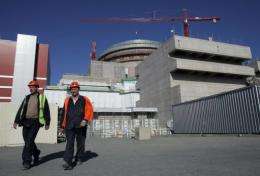Workers leave a power plant run by Finnish company TVO, on May 11, 2011, on Olkiluoto island around 100 kilometres north of Turku. Finnish electricity company TVO revealed on Monday a new delay in the operation of an EPR nuclear reactor being built by Areva and Siemens which is already five years late.
Finnish electricity company TVO revealed on Monday a new delay in the operation of an EPR nuclear reactor being built by Areva and Siemens which is already five years late.
TVO said that the reactor being built in southwestern Finland known as Olkiluoto 3 would not be ready to produce electricity normally in 2014 as previously expected and that a new timetable had not been set, blaming its partners for the delay.
"The plant unit's installation works and plant automation system engineering under the responsibility of the supplier have not progressed according to the supplier's schedules," the Finnish company said in a statement.
The European Pressurized Reactor (EPR) is the name for a new generation of nuclear technology, yet to be put into production.
TVO said that it was waiting for the construction companies working together in a consortium, Areva of France and Siemens of Germany, "to update the overall schedule and provide a new confirmation and analysis of the completion date as well as clarification of the measures needed to keep up with the schedule."
Monday's announcement marked only the latest in a string of setbacks for the construction project, which began in 2005, with the reactor initially supposed to begin producing electricity in 2009.
The Finnish EPR, which is an example of so-called third generation nuclear technology developed by Areva and which is set to have a capacity of 1,600 megawatts, was first delayed until November 2010, then to December 2011 and then to August 2014.
TVO said Monday that it was not satisfied with recurrent delays in the project but stressed solutions to various problems were being found one by one and work was progressing.
At the end of 2011, Areva said it had completed two thirds of the work on its third generation reactor, which it claims is safer, more durable and offers better performance than its competitors.
Contacted by AFP, Areva offered no comments to the latest setback at Olkiluoto 3, which has already forced the French company alone to spend more in provisions than the 3.0 billion euros the consortium sold the reactor for in 2004, and of which Areva only received 1.8 billion.
TVO and its suppliers have been locked in a legal battle over who is to blame for the repeated delays, with Areva-Siemens winning a partial victory earlier this month when the International Chamber of Commerce's arbitration tribunal in Paris ordered TVO to pay 125 million euros ($155 million) in unpaid construction fees and accrued interest.
But TVO, which has made counter-claims against Areva-Siemens, was quick to point out that the partial ruling "takes no position on the (overall) delay of the plant unit and the cost resulting from the delay."
Three other EPR reactors are being built in the world: one in Flamanville in northeastern France, and two in Taishan in southeastern China.
The Flamanville reactor is also marred in difficulties and running four years late with production now set to begin only in 2016, and it appears likely that China will be the first country in the world to operate an EPR reactor, given the speed of work on the two there.
The first of these is due to enter service at the end of 2013 and the second a year later.
(c) 2012 AFP























